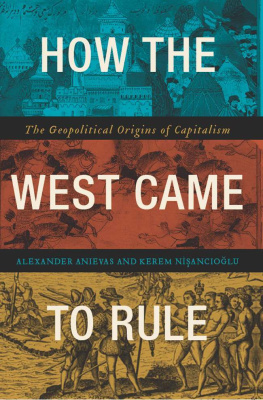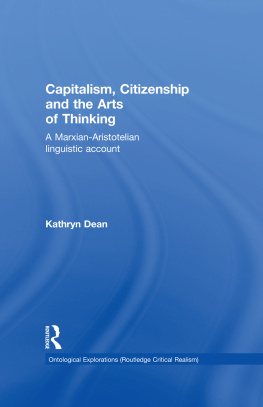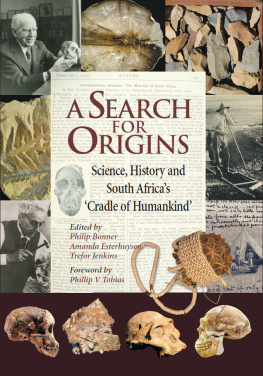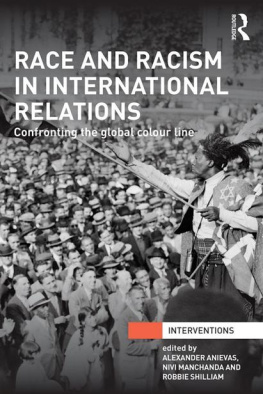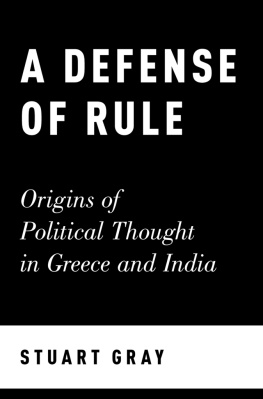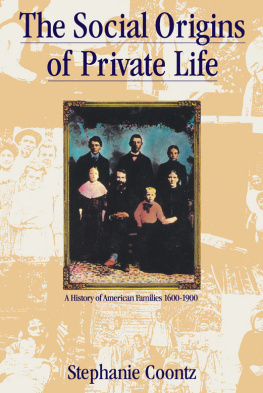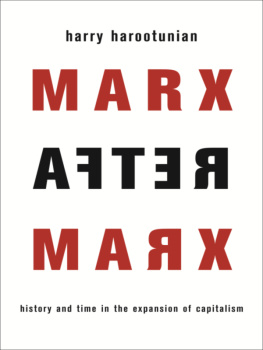HOW THE WEST CAME TO RULE
How the West
Came to Rule
The Geopolitical Origins
of Capitalism
Alexander Anievas and
Kerem Niancolu

First published 2015 by Pluto Press
345 Archway Road, London N6 5AA
www.plutobooks.com
Copyright Alexander Anievas and Kerem Niancolu 2015
The right of Alexander Anievas and Kerem Niancolu to be identified as the authors of this work has
been asserted by them in accordance with the Copyright, Designs and Patents Act 1988.
British Library Cataloguing in Publication Data
A catalogue record for this book is available from the British Library
ISBN 978 0 7453 3521 6 Hardback
ISBN 978 0 7453 3615 2 Paperback
ISBN 978 1 7837 1323 3 PDF eBook
ISBN 978 1 7837 1325 7 Kindle eBook
ISBN 978 1 7837 1324 0 EPUB eBook
This book is printed on paper suitable for recycling and made from fully managed and sustained forest sources. Logging, pulping and manufacturing processes are expected to conform to the environmental standards of the country of origin.
10 9 8 7 6 5 4 3 2 1
Typeset by Curran Publishing Services, Norwich, England
Text design by Melanie Patrick
Simultaneously printed by CPI Antony Rowe, Chippenham, UK
and
Edwards Bros in the United States of America
Contents
Figures
please note that the maps are not precisely to scale.
Acknowledgements
This book has been almost three years in the making. Its origins lie in a collaborative article written for Millennium Journal of International Studies in 201213 entitled Whats at stake in the transition debate? Rethinking the origins of capitalism and the rise of the West. It was here that we first explored the possibility of rewriting the history of capitalisms genesis by drawing on the framework of uneven and combined development. As this led us to a radical departure from histories centred on European developments, it became evident that there was a considerably more extensive and complex story to tell about the origins of capitalism. Our initially brief engagement with the global history of the 13th17th centuries rendered evident a palpable dissatisfaction with the Eurocentrism of dominant accounts of this period. It appeared not only that vast swathes of key historical events, actors and processes had been left hidden behind the veil of Eurocentrism, but that the theorisations constructed from this narrow geohistorical vantage point had left the field of historical sociology with only a partial understanding of capitalist modernity. Moreover, it appeared that our very engagement with the historical record would demand some reconsideration of the theoretical conclusions we drew back in 2013. We were thus driven back to the drawing board back to history, back to theory and into an enormously stimulating collaborative project of research, debate and writing. How the West Came to Rule is the result.
We see this book as an outcome of a collective endeavour in three respects. First, although much of the research and drafting process for the book was done individually, the end product was built on constant dialogue and various moments of creative agreement and disagreement. Indeed, the chapters we are most proud of are those where our collaboration in terms of research, discussion and drafting were most intensive.
Second, this book covers a roughly 600-year time span, and stretches geographically from Indonesia, along the Indian Ocean littoral, through the Middle East to Europe, West Africa, and across the Atlantic to the Americas. Such is the sweeping nature of the project that we have, out of necessity, deferred to and critically engaged with specialists in numerous areas of expertise beyond our own. We have also, out of necessity, selected and bracketed certain historical events, actors and processes from our narrative gaps that we hope will be the source of further scholarship and critique for future researchers to follow up. As such, we appreciatively recognise that this book would not have been possible were it not for the extensive and important work carried out by the scholarswe draw on. We hope that in writing this book, we will have done justice to these specialists, and hope to have made a humble yet critical contribution to the fields they work in.
Third, we are indebted to the wider network of personal, moral and scholarly support that has undergirded this entire project. We are grateful to the many colleagues and scholars who provided helpful comments on or discussed particular aspects of earlier chapter drafts, including Jamie Allinson, Josef Ansorge, Tarak Barkawi, Duncan Bell, Gurminder Bhambra, Pepijn Brandon, Gareth Dale, Neil Davidson, Kyle Geraghty, Henry Heller, John Hobson, Joseph Kay, Rob Knox, Tor Krever, Nivi Manchanda, David Ormrod, Charlie Post, Gonzalo Pozo-Martin, Justin Rosenberg, Andrs Senz de Sicilia and Ben Selwyn. Special gratitude is owed to Luke Cooper, Kamran Matin and Cemal Burak Tansel who were all kind enough to read over multiple drafts of chapters. Wed also like to thank David Castle at Pluto Press for his continuing enthusiasm for the project and patience in waiting for its completion. We are also grateful to Susan Curran who did a fantastic job with the copy-editing.
Kerem would like to thank his parents, ule and Murat, and brother Deniz for their unflinching and unconditional love and support. Kerem is especially grateful to Hollie Hutton without her encouragement and compassion this project would have never been started, let alone completed. Alex would like to thank his family (Arturo, Pam, Erik, Cathy, and Uncle Ralph), and friends, particularly Luke, Vin, Andy, Dominic, Craig, and the dearly missed Matt Gibney and Lisa Smirl to the latter of whom this book is dedicated. He would also like to thank his wife, Linda Szilas, who not only gave a fair amount of her own time in designing the map illustrations in this book, but also provided her wholehearted and unwavering love and support throughout the writing and researching of this project. Finally, Alex would like to acknowledge the generous funding and support provided by the Leverhulme Trust.
In addition to the above-noted Millennium article from which this project originated, we published two further articles based upon the research for this book: The Ottoman origins of capitalism: uneven and combined development and Eurocentrism, Review of International Studies, Vol. 40, No. 2 (2014): 32547; and, Revolutions and international relations: rediscovering the classical bourgeois revolutions, European Journal of International Relations, forthcoming. Some of the materials originally published in these articles are reproduced in the following pages, and we are grateful to the journal publishers for their permission to use those materials.
Alexander Anievas
Kerem Niancolu
April 2015
Dedicated to the loving memory of Lisa Smirl
Introduction
History is the Nightmare from which I am trying to awake.
James Joyce, 1922
The writing of historical sociologies is inescapably wedded to the contexts in which they emerge; we write history but do not do so in conditions of our choosing. For decades, these conditions have been marked by End of History triumphalism and claims that there is no alternative to liberal capitalism. In turn, capitalism as a transient, historically specific and contradictory unit of study has been bracketed out of if not completely wiped off the scholarly and political agenda. Yet, after stock markets came crashing down in 2008, the force of history reasserted itself in a series of revolutions, occupations of public places, anti-austerity protests, strikes, riots and anti-state movements taking place from London to Ferguson (Missouri), Athens, Cairo, Istanbul, Rojava, Santiago and beyond. Such movements have torn at the hubristic certainties of capitalist realism and started to sporadically if inconsistently challenge such long-held common sense truisms and the power structures that undergird them.
Next page
